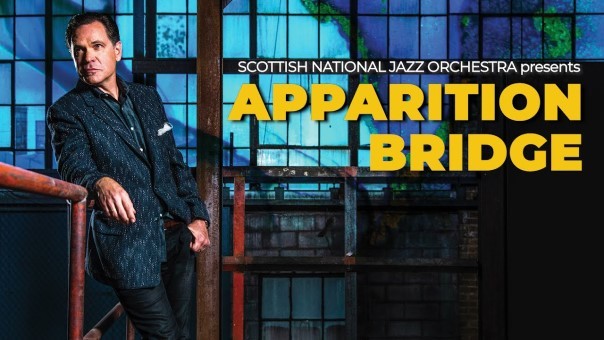To say that Tommy Smith and the Scottish National Jazz Orchestra’s latest collaboration with the two-time Grammy-winning vocalist Kurt Elling is a hard play and an even harder listen is to give their four-city concert series Apparition Bridge a great compliment.
Easy listening has its time and place: frequent and ubiquitous. But hard listening is a rare bird which seldom flies. But when it soars with the majesty of the “fearless leader” (Elling’s b of the bang-on-the-money description of the band’s debonair director) it’s enough to stir your Covid-scorched soul into agreeing with the hopeful sentiments of their moving encore: You Must Believe In Spring by Michel Legrand elevated with a haunting new arrangement by American pianist Geoffrey Keezer.
In a recent interview with Seonaid Aitken for BBC Radio Scotland’s excellent weekly broadcast Jazz Nights, Smith recounted that what he most admired about Elling when they first met was that he had “never known anyone who can take command of a jazz orchestra the way that Kurt did.”
A compliment which Elling returned in their informative and thought-provoking pre-concert discussion about the origins of European jazz when he effused that he “can’t praise him enough” as a musician, band leader and composer because he channels all of his creative energy into “quality”. An incredible quality which is the hallmark of the Scottish National Jazz Orchestra’s impressive body of daring and diverse work of which Apparition Bridge is a fine addition.
Promising to “reconnect us all through music” as they “span the ethereal chasms between the ancient and the future, between sorrow and joy, and between time and timelessness”, this all-new concert series – exclusive to Scotland – features fresh arrangements and lyrics to the works of largely living European composers including the Swedish pianist Lars Jansson, Norwegian saxophonist Jan Garbarek and Scotland’s very own Hue & Cry whose opening track to their Jazz Not Jazz album Free Like You was given a blistering new arrangement by Bill “Barn-Burning” Dobbins.
A far cry from the brooding nature of so many of the tunes – as epitomised by the philosophical lyrics of Anne Mette Iversen’s titular “Some day / My life will end in time / Become a dream” – which as Elling remarked (not in a pejorative sense) is perhaps an inherent feature of contemporary European jazz which may have sacrificed the gospel-inspired rhythm-and-blues of its Afro-American roots in favour of a more intellectualised approach closer to the classical and folk traditions native to Europe. Discuss.
The “ethereal chasms” mined for meaning by an array of A-list arrangers including Joe Locke (who was in attendance) and Brian Byrne (who graduated from the nearby Royal Scottish Academy of Music and Drama) were bridged with audacious aplomb by the 16-strong band, with Konrad Wiszniewski a particular standout as he blew the bejesus out of his howling-to-the-moon sax. A muscularity beautifully counterbalanced by the delicate flights of fancy of Yvonne Robertson’s flute. Both of which raised the existential call-and-response at the heart of the apparitional project: I am here. Why am I here?
With the chasm bridged between musicians and the socially-distanced sold-out audience of the New Auditorium of Glasgow Royal Concert Hall (a venue praised by Elling for having “the best acoustics – so far – for the kind of music we’re about to play”), we were left with the sentiments of Michiel Borstlap’s award-winning composition echoing in the caverns of our minds. Namely, a Memory of Enchantment.
- REVIEW: Orphans @ Edinburgh King’s Theatre
- 13th April 2022
- REVIEW: Everybody’s Talking About Jamie @ Edinburgh Festival Theatre
- 30th March 2022
- REVIEW: Sheila’s Island @ Edinburgh King’s Theatre - 2nd March 2022











